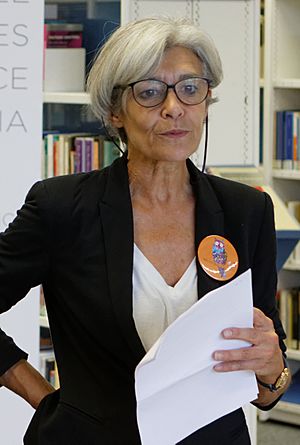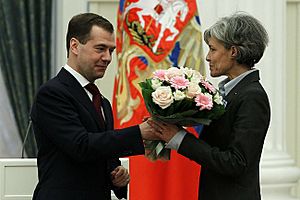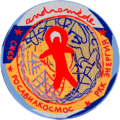Claudie Haigneré facts for kids
Quick facts for kids
Claudie Haigneré
|
|
|---|---|
 |
|
| Born | 13 May 1957 Le Creusot, France
|
| Status | Retired |
| Occupation | Rheumatologist Astronaut |
| Awards | |
| Space career | |
| CNES/ESA astronaut | |
|
Time in space
|
25d 14h 22min |
| Selection | 1985 CNES Group 2 1999 ESA Group |
| Missions | Soyuz TM-24, Mir-Cassiopée, Soyuz TM-23, Soyuz TM-33, ISS-Andromède, Soyuz TM-32 |
|
Mission insignia
|
|
Claudie Haigneré, born on May 13, 1957, is a famous French doctor, politician, and former astronaut. She made history as the first female astronaut from the French space agency (CNES) and the European Space Agency (ESA) to travel into space.
Contents
Becoming an Astronaut
Claudie Haigneré was born in Le Creusot, France. She studied medicine at universities in Paris. She earned several degrees, including one in rheumatology, which is the study of joint and muscle diseases. She also specialized in aviation and space medicine, which is about how space travel affects the human body. In 1992, she earned a doctorate in neuroscience, which is the study of the brain and nervous system.
Her Path to Space
In 1985, the French space center chose only seven people to become astronauts. Claudie Haigneré was the only woman selected. She first trained as a back-up astronaut for a mission called Mir Altaïr in 1993. Her future husband, Jean-Pierre Haigneré, was part of that mission. Later, an asteroid was named 135268 Haigneré to honor both of them.
First Space Mission
In 1994, Claudie Haigneré began training in Russia at the Yuri Gagarin Cosmonaut Training Center. She learned Russian during her time there. On August 17, 1996, she made history. She became the first French woman to go to space! She launched aboard the Soyuz TM-24 spacecraft with two Russian cosmonauts.
During this mission, Haigneré spent 16 days on the Mir space station. She performed many experiments. These experiments looked at how the human body works in space and how fluids behave in microgravity.
More Space Adventures
In 1999, Claudie Haigneré became the first woman to command a Soyuz capsule during its return to Earth. This showed her amazing skill and leadership. In 2001, she flew again as a flight engineer on Soyuz TM-33. This time, she became the first European woman to visit the International Space Station (ISS).
After her space missions, Haigneré continued to work in space science. She attended many scientific meetings and helped analyze data for future space projects. She officially retired from the European Space Agency in June 2002.
Life After Space
After her exciting career as an astronaut, Claudie Haigneré entered French politics.
Political Roles
From 2002 to 2004, she served as a minister for Research and New Technologies. This role involved overseeing government efforts in science and innovation. From 2004 to 2005, she was a minister for European Affairs. In this position, she worked on France's relationships with other European countries.
Helping Science and Education
Claudie Haigneré has also been involved in many organizations that promote science and education.
- Cité de l'espace: In 1996, while still in space, she agreed to be the honorary patron of the Cité de l'espace. This is a science discovery center in Toulouse, France. She attended its opening in 1997 and still holds this role today.
- Universcience: In 2009, she became the founding director of Universcience. This organization brought together two major science museums in Europe: the Cité des Sciences et de l'Industrie and the Palais de la Découverte. She led Universcience until 2015.
- ESA Advisor: After leaving Universcience, she returned to the European Space Agency as a special advisor to its Director General.
- DStv Eutelsat Star Awards: In 2018, Haigneré became the head judge for the DStv Eutelsat Star Awards. This is a competition for students in Africa. They write essays or create posters about science and technology. Her role marked the first time a woman chaired the judging panel for this award.
Awards and Recognition

Claudie Haigneré has received many important awards for her achievements.
- She was honored with the Chevalier of the Légion d'Honneur and the Chevalier of the Ordre National du Mérite, which are high French honors.
- For her work with Russia in space, she received the Russian Order of Friendship.
- She also received the Russian Medal "For Merit in Space Exploration" and the Medal for Personal Valour.
She is also an honorary member of several important aerospace groups, including the International Academy of Astronautics. Many streets in French towns are named after her, showing how much she is respected.
Images for kids
See also
 In Spanish: Claudie Haigneré para niños
In Spanish: Claudie Haigneré para niños
 | Precious Adams |
 | Lauren Anderson |
 | Janet Collins |








